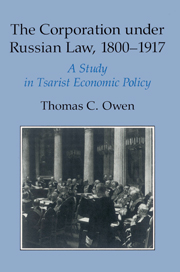Book contents
- Frontmatter
- Contents
- List of tables
- Preface
- Abbreviations
- The corporation under Russian law, 1800–1917
- 1 Zakon (The law), 1800–1856
- 2 Birzhevaia goriachka (Stock-exchange fever), 1856–1870
- 3 Proval reformy (The failure of reform), 1860–1874
- 4 Opeka (Tutelage), 1865–1890
- 5 Proizvol (Arbitrary acts), 1880–1905
- 6 Bezobrazie (Outrage), 1905–1914
- 7 Tupik (Dead end), 1914–1917
- 8 Autocracy, corporate law, and the dilemma of cultural delay
- Selected bibliography
- Index
- Studies of the Harriman Institute
4 - Opeka (Tutelage), 1865–1890
Published online by Cambridge University Press: 22 September 2009
- Frontmatter
- Contents
- List of tables
- Preface
- Abbreviations
- The corporation under Russian law, 1800–1917
- 1 Zakon (The law), 1800–1856
- 2 Birzhevaia goriachka (Stock-exchange fever), 1856–1870
- 3 Proval reformy (The failure of reform), 1860–1874
- 4 Opeka (Tutelage), 1865–1890
- 5 Proizvol (Arbitrary acts), 1880–1905
- 6 Bezobrazie (Outrage), 1905–1914
- 7 Tupik (Dead end), 1914–1917
- 8 Autocracy, corporate law, and the dilemma of cultural delay
- Selected bibliography
- Index
- Studies of the Harriman Institute
Summary
Industry, progress, education, all sleep; and looking out of the carriage windows at the vast expanse of snow, the mind naturally receives the idea that it is the counterpane of a sleeping nation.
– George Hume, English machinery salesman, in a letter composed on a train near Kharkov (February 11, 1879)The Russian verb based on the noun “tutelage” or “wardship” (opeka) is opekat', meaning “to have the wardship of,” “to watch over,” or “to take care of.” The frequent use of these words in discussions of Russian economic history (witness the use of the term opeka by the scholars Pakhman and Tarasov quoted in the previous chapter) suggests that the notion of bureaucratic wardship over the Russian economy had strong roots in what passed for political culture under the tsars. In the field of corporate history, clear expressions of this attitude can be found as early as the reign of Peter the Great. In his decree urging the establishment of a Russian company to trade with Spain, he declared that the College of Commerce “must look after this innovation as a mother looks after her child growing to maturity.” Such encouragement was essential “because everyone knows that our people do not initiate anything by themselves” (ponezhe vsem izvestno, chto nashi liudi ni vo chto sami ne poidut).
- Type
- Chapter
- Information
- The Corporation under Russian Law, 1800–1917A Study in Tsarist Economic Policy, pp. 79 - 115Publisher: Cambridge University PressPrint publication year: 1991



